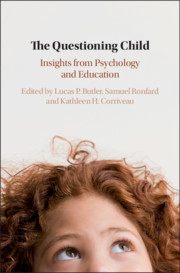Book contents
- The Questioning Child
- The Questioning Child
- Copyright page
- Dedication
- Contents
- Figures
- Tables
- Contributors
- 1 Questions about Questions
- 2 Questions in Development
- 3 The Point, the Shrug, and the Question of Clarification
- 4 The Quest for Comprehension and Learning
- 5 Children’s Question-Asking across Cultural Communities
- 6 The Development of Information-Requesting Gestures in Infancy and Their Role in Shaping Learning Outcomes
- 7 Developmental Changes in Question-Asking
- 8 Understanding Developmental and Individual Differences in the Process of Inquiry during the Preschool Years
- 9 “Why Are There Big Squares and Little Squares?”
- 10 Children’s Questions in Social and Cultural Perspective
- 11 Mothers’ Use of Questions and Children’s Learning and Language Development
- 12 Teaching and Learning by Questioning
- 13 Asking “Why?” and “What If?”
- 14 What Makes a Good Question? Towards an Epistemic Classification
- 15 The Questioning Child
- Index
- References
7 - Developmental Changes in Question-Asking
Published online by Cambridge University Press: 10 January 2020
- The Questioning Child
- The Questioning Child
- Copyright page
- Dedication
- Contents
- Figures
- Tables
- Contributors
- 1 Questions about Questions
- 2 Questions in Development
- 3 The Point, the Shrug, and the Question of Clarification
- 4 The Quest for Comprehension and Learning
- 5 Children’s Question-Asking across Cultural Communities
- 6 The Development of Information-Requesting Gestures in Infancy and Their Role in Shaping Learning Outcomes
- 7 Developmental Changes in Question-Asking
- 8 Understanding Developmental and Individual Differences in the Process of Inquiry during the Preschool Years
- 9 “Why Are There Big Squares and Little Squares?”
- 10 Children’s Questions in Social and Cultural Perspective
- 11 Mothers’ Use of Questions and Children’s Learning and Language Development
- 12 Teaching and Learning by Questioning
- 13 Asking “Why?” and “What If?”
- 14 What Makes a Good Question? Towards an Epistemic Classification
- 15 The Questioning Child
- Index
- References
Summary
Asking questions is a powerful learning tool that children take full advantage of, as they are well-known to be prolific and determined question-askers. But do children ask good questions? In this chapter, we review and discuss qualitative and quantitative studies to trace the developmental trajectory of children’s question–asking strategies, focusing on their effectiveness and adaptiveness. Previous research has so far established three milestones: children’s question–asking abilities evolve from being able to identify effective questions, but not being able to spontaneously generate them at the age of five, to beginning to generate effective questions from scratch at age seven, to implementing efficient and adaptive question–asking strategies by the age of ten, echoing adult–level patterns of performance. We discuss how the cognitive and environmental factors driving these developmental changes still remain unclear, and how taking a multidisciplinary approach might be necessary to fill these gaps. We argue that the results from research on question-asking have the potential to inform educational policies, and to help design targeted training interventions and educational curricula that exploit the early emergence of these skills and support their further development, providing children with a toolbox of strategies and concepts they can use to effectively navigate the world.
Keywords
- Type
- Chapter
- Information
- The Questioning ChildInsights from Psychology and Education, pp. 118 - 143Publisher: Cambridge University PressPrint publication year: 2020
References
- 7
- Cited by

